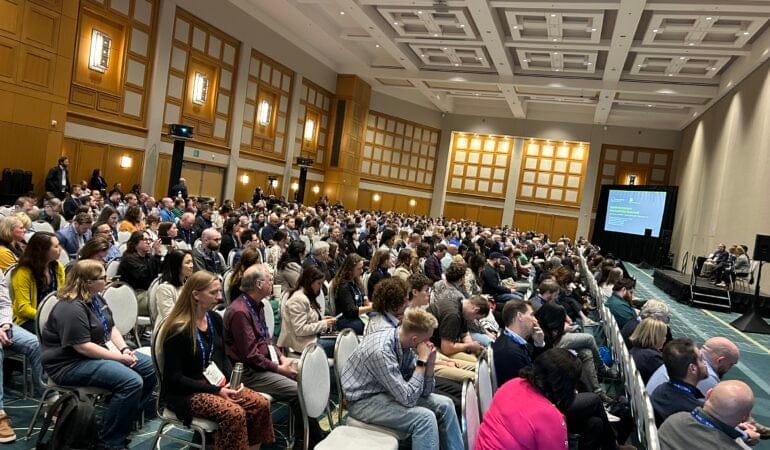
Lincoln Institute at the 2024 National Planning Conference
Experts from the Lincoln Institute of Land Policy will lead and participate in discussions about housing affordability, planning foresight, and scenario planning as well as host a panel discussion with the mayors of Minneapolis, Cincinnati, and Scranton at the American Planning Association’s National Planning Conference from April 13 to 15 in Minneapolis.
We encourage conference attendees to stop by the Lincoln Institute’s booths (#1003 and #1005) in the exhibit hall to explore multimedia displays and our wide range of publications. Policy Focus Reports will be available free of charge, and conference attendees can purchase books at a discount, including Mayor’s Desk: 20 Conversations with Local Leaders Solving Global Problems, Megaregions and America’s Future, Scenario Planning for Cities and Regions, and Design with Nature Now.
In May, Lincoln Institute researchers will present an additional set of online sessions in the virtual portion of the conference.
Learn more about the in-person and online sessions featuring Lincoln Institute staff below.
SATURDAY, APRIL 13
12–12:20 p.m. CT | XSP for Advancing Housing Affordability and Availability Strategies (Room 102 AB)
In the United States, housing supply is increasingly limited and costly, contributing to a housing crisis that has left millions of Americans homeless, rent burdened, displaced, or unable to afford to live in certain areas. The Consortium for Scenario Planning at the Lincoln Institute of Land Policy has selected four project proposals that will work through May 2024 using workshops, games, toolkits, and reports to study or apply exploratory scenario planning to examine local housing trends and generate strategies that improve housing affordability and accessibility.
Moderator & Speaker: Libertad Figuereo, Lincoln Institute of Land Policy
SUNDAY, APRIL 14
11:30–12:15 p.m. CT | Emerging Trends and Signals: The 2024 Trend Report (Room 200 F – J)
This presentation describes emerging trends that will be important for planners to consider and introduces ways to make sense of the future and practice foresight in community planning. With foresight (i.e., understanding potential future trends and knowing how to prepare for them) in mind, planners can guide change, create more sustainable and equitable outcomes, and establish themselves as critical to a thriving community. The practice of foresight is imperative when preparing communities for what’s coming.
Moderator & Speaker: Petra Hurtado, PhD, American Planning Association
Speakers:
- Sagar Shah, PhD, AICP, American Planning Association
- Ievgeniia Dulko, American Planning Association
- Joseph DeAngelis, AICP, American Planning Association
MONDAY, APRIL 15
8:30 a.m. – 9:15 a.m. CT | Imagine 2050: Scenario Planning for the MSP Region (Room 200 A – E)
The future is full of uncertainty that can paralyze today’s public actions. In this session, you will learn how the Twin Cities Metropolitan Council is exploring future scenarios to manage uncertainty and coordinate long-range policies and investments.
Moderator & Speaker: Dan Marckel, Metropolitan Council of the Twin Cities
Speakers:
- Heather Sauceda Hannon, AICP, Lincoln Institute of Land Policy
- Baris Gumus-Dawes, Metropolitan Council of the Twin Cities
10:30 a.m. – 11:15 a.m. CT | Equitable Revitalization in Postindustrial Cities: Mayors Panel (Ballroom B)
Mayors of US cities will join Anthony Flint of the Lincoln Institute of Land Policy—author of the recently published book Mayor’s Desk—to discuss how policy makers and planners are working together to reinvent their cities in the face of climate change, a housing affordability crisis, and other challenges. Planners will be able to gain key takeaways from municipal leaders, and explore the challenges and opportunities ahead.
Moderator & Speaker: Anthony Flint, Lincoln Institute of Land Policy
Speakers:
- Jessie Grogan, Lincoln Institute of Land Policy
- Mayor Aftab Pureval, City of Cincinnati
- Mayor Jacob Frey, City of Minneapolis
- Mayor Paige Cognetti, City of Scranton
WEDNESDAY, MAY 8 (VIRTUAL)
12:30–1:15 p.m. CT | Cities Post Pandemic: Adaptive and Inclusive (Channel 2)
Planning directors from a few of the largest cities in the United States will be joined by an expert on changes happening in cities post pandemic. They will discuss the struggle for inclusive growth in adapting downtowns to a changing economy and society.
Moderator and Speaker: Jessie Grogan, AICP, Lincoln Institute of Land Policy
Speakers:
- Tracy Loh, PhD, Brookings Institution
- Samuel P. Leichtling, AICP, City of Milwaukee Department of City Development
- Lourenzo Giple, City of Indianapolis
THURSDAY, MAY 9 (VIRTUAL)
10:00–10:45 a.m. CT | Equitable Climate Migration Receiving Communities (Channel 2)
This panel will convene learned experts from across the country to discuss the ways knowledge, policy, and research around climate migration impact receiving communities. Migration poses challenges and creates opportunities to make transformational change; the panel will focus on the tools and policy recommendations available to planners.
Moderator and Speaker: Patrick Welch, AICP, Lincoln Institute of Land Policy
Speakers:
- Amy Cotter, Lincoln Institute of Land Policy
- Damla Kuru, PhD, University of Massachusetts, Amherst
Catherine Benedict is the digital communications manager at the Lincoln Institute of Land Policy.
Lead image (inset photo): Office of Minneapolis Mayor Jacob Frey.
